Experiencing loose motions in your dog can be distressing for any pet parent. While often a minor issue, persistent or severe diarrhea can indicate more serious underlying health problems. Understanding the potential causes, knowing effective home care strategies, and recognizing when professional veterinary help is crucial can make a significant difference in your dog’s recovery. This guide will walk you through everything you need to know about managing loose motions in dogs, with a special focus on appropriate Loose Motion Medicine For Dogs prescribed by your vet, ensuring your furry friend gets back to their happy, healthy self. Early intervention and informed decisions are key to managing your dog’s digestive health effectively and knowing the best way to get dog to take pills can certainly help in administering prescribed medication.
Understanding Loose Motions in Dogs: Common Causes
Loose motions, or diarrhea, in dogs can stem from a wide array of factors, ranging from simple dietary indiscretions to complex medical conditions. It’s a common symptom indicating an upset in your dog’s digestive system. Pinpointing the exact cause is essential for effective treatment and preventing future episodes. Often, dogs consume things they shouldn’t, which can quickly lead to stomach upset.
For instance, eating spoiled food from the trash or getting into table scraps can trigger an acute bout of diarrhea. Beyond dietary factors, more serious issues like parasitic infections, bacterial overgrowth, or viral diseases can also be at play. Even stress and anxiety, or underlying chronic illnesses affecting organs like the liver or pancreas, can manifest as loose stools. Observing your dog’s symptoms and behavior carefully is the first step in identifying the potential trigger and seeking appropriate care. A proper diagnosis from a veterinarian is always recommended to ensure the right course of action, especially if you suspect issues like heartworm medicine might be a consideration for other health concerns.
12 Common Reasons Your Dog Has Diarrhea
Loose motion in dogs can arise for a variety of reasons, from minor digestive upset to serious medical conditions. Here are twelve of the most common culprits:
- Eating Garbage or Table Scraps: Dogs are notorious for exploring trash cans and indulging in forbidden table scraps. Consuming spoiled food or waste often leads to gastrointestinal upset, commonly known as garbage toxicosis, causing stomach pain and loose motion.
- Sudden Dietary Changes: A rapid switch in dog food brands, or transitioning puppies too quickly from milk to solid food, can disrupt their delicate digestive balance, resulting in diarrhea as their gut struggles to adjust to new proteins and ingredients.
- Dietary Intolerance or Food Allergies: Similar to humans, some dog breeds have difficulty digesting specific components like lactose, gluten, or certain proteins. This can manifest as chronic stomach upset and loose motions. Always introduce new diets gradually and under veterinary guidance.
- Parasites: Intestinal parasites such as roundworms, hookworms, coccidia, or giardia are a prevalent cause of loose motion in dogs, particularly in unvaccinated or non-dewormed puppies. Regular deworming is vital for prevention.
- Toxins and Poisons: Many common household foods, including onions, garlic, chocolate, and raisins, are highly toxic to dogs. Ingesting even small quantities can lead to severe vomiting, diarrhea, and potentially life-threatening poisoning, necessitating immediate veterinary attention.
- Poisonous Plants: Various indoor and outdoor plants, such as aloe vera, dieffenbachia, arum lily, and oleander, can irritate a dog’s gastrointestinal tract if ingested. This irritation can result in severe loose motions. Ensure all potentially harmful plants are kept out of your pet’s reach.
- Swallowing a Foreign Body: Dogs, especially puppies, might swallow non-food items like socks, small toys, or bones. These foreign bodies can cause intestinal blockage, leading to vomiting and diarrhea. Such situations require urgent veterinary intervention and diagnostic imaging for safe removal.
- Bacterial Infections: Consuming contaminated water or raw meat can expose dogs to harmful bacteria like Salmonella or E. coli. These infections typically cause watery diarrhea, vomiting, and abdominal pain, often requiring a course of antibiotics.
- Viral Infections: Unvaccinated puppies are highly susceptible to dangerous viral infections such as Parvovirus, Distemper, and Coronavirus. These diseases can cause severe, often bloody diarrhea, and necessitate immediate hospitalization for intravenous fluids and aggressive treatment.
- Chronic Illnesses: Persistent loose motion in dogs may be a symptom of more serious underlying conditions, including liver, kidney, or pancreatic disease, or inflammatory bowel disease (IBD). Long-term diarrhea always warrants comprehensive veterinary testing to diagnose and manage these conditions.
- Antibiotics: Even veterinary-prescribed antibiotics can sometimes disturb your dog’s natural gut flora, leading to temporary diarrhea or soft stools as a side effect. Probiotics are often recommended to help restore healthy digestion after antibiotic use.
- Stress and Anxiety: Just like humans, dogs can experience stress-induced colitis, where emotional stress triggers digestive upset. This is common during events like travel, loud noises (fireworks, thunderstorms), or significant changes in their daily routine, leading to recurrent loose motion and stomach discomfort.
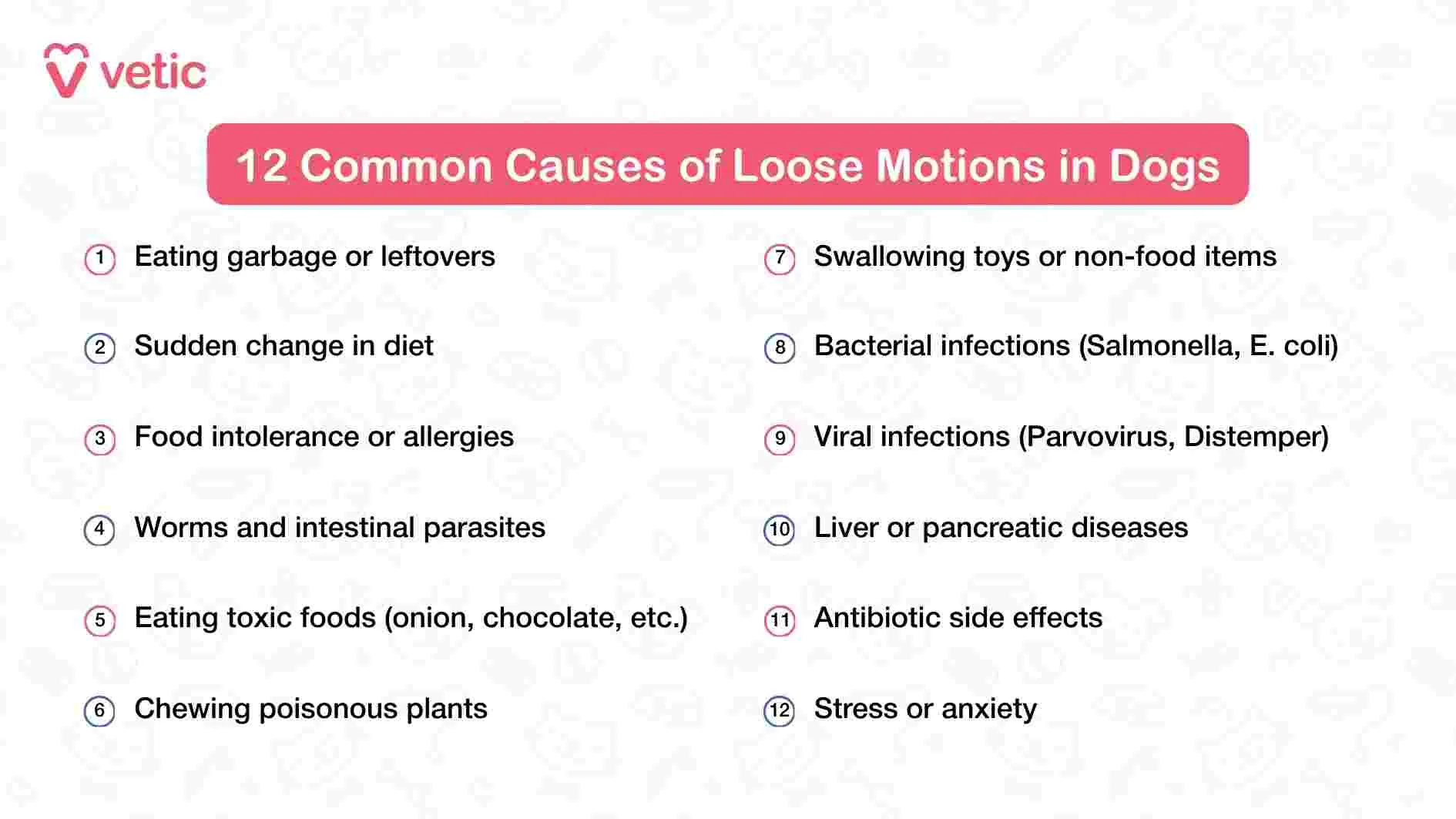 Educational graphic listing twelve common causes of diarrhea in dogs, including dietary changes, parasites, infections, and stress.
Educational graphic listing twelve common causes of diarrhea in dogs, including dietary changes, parasites, infections, and stress.
In most mild cases, diarrhea might resolve within 24 to 48 hours. However, if loose motions are severe, persistent, or accompanied by other worrying symptoms, immediate medical attention is necessary to rule out serious infections or underlying diseases. A simple blood test and stool analysis can help your veterinarian diagnose the specific cause and recommend the most effective treatment plan for your beloved pet.
Finding the Right Loose Motion Medicine for Dogs
When your dog is experiencing loose motions, your first instinct might be to reach for an over-the-counter remedy. However, it is paramount to always consult a veterinarian before administering any medication. Many human medications, while seemingly similar, differ drastically in dosage and safety for dogs and can cause more harm than good. Self-medication can mask serious symptoms, delay proper diagnosis, or even be toxic to your canine companion.
Your veterinarian will conduct a thorough examination, possibly including stool and blood tests, to determine the exact cause of the diarrhea. Based on their diagnosis, they might recommend one or a combination of the following loose motion medicine for dogs:
- Probiotics and Prebiotics: These are often prescribed to help restore the natural balance of beneficial bacteria in your dog’s gut, which can be disrupted by illness, stress, or antibiotic use. Probiotics introduce good bacteria, while prebiotics provide food for these bacteria, promoting a healthy digestive environment.
- Anti-diarrhoeal Suspensions: These are specifically formulated for dogs to help slow down intestinal motility and reduce the frequency of loose stools. They are not always suitable for all causes of diarrhea, as sometimes the body needs to expel toxins. Your vet will advise if these are appropriate.
- Oral Rehydration Salts (ORS): Diarrhea can quickly lead to dehydration and electrolyte imbalance. ORS are vital for replenishing lost fluids and essential minerals, helping to prevent the severe complications of dehydration. These are particularly important for puppies and senior dogs, who are more vulnerable.
- Antibiotics or Anti-parasitic Drugs: If bacterial infections or parasitic infestations (like worms, giardia, or coccidia) are confirmed through diagnostic tests, your vet will prescribe specific antibiotics or anti-parasitic medications to target the causative agent. Never use antibiotics for dogs without veterinary supervision, as incorrect dosing or inappropriate use can lead to antibiotic resistance or severe side effects. Similarly, using the wrong flea and tick treatment for cats and dogs could cause issues.
It’s crucial to follow your vet’s dosage instructions precisely and complete the full course of any prescribed medication, even if your dog’s symptoms improve rapidly. This ensures complete recovery and helps prevent recurrence or the development of drug resistance. Remember, the best loose motion medicine for dogs is one that is specifically prescribed for your pet’s unique condition by a qualified veterinarian. For those looking for effective but affordable treatments, seeking out discount flea and tick meds for dogs could also be an option for preventative care against certain diarrhea-causing parasites.
What to Feed Your Dog When They Have Diarrhea
When your dog is experiencing loose motions, their intestines are often inflamed and irritated. Providing gentle, bland meals is crucial for soothing their digestive system and preventing further upset. The goal is to give their gut a chance to rest and recover.
A common initial approach, unless your vet advises against it, is to withhold solid food for 12 to 18 hours. This allows the digestive tract to clear out and reduces irritation. During this period, it’s paramount to ensure your dog has constant access to fresh, clean water to prevent dehydration. You might also offer veterinary oral rehydration solutions to replenish lost electrolytes.
Once the initial fasting period is over, or as advised by your vet, gradually reintroduce easy-to-digest foods in small, frequent portions rather than one large meal. Here are some bland diet options often recommended:
- Plain Boiled Chicken: Skinless, boneless, and unseasoned boiled chicken is an excellent source of lean protein that is easy for dogs to digest. Avoid any spices, oils, or fats.
- White Rice or Boiled Potatoes: Plain white rice (cooked until soft) or boiled potatoes (peeled and mashed) provide carbohydrates that are gentle on the stomach and can help bind stool.
- Pumpkin Puree: Pure canned pumpkin (not pumpkin pie filling, which contains sugar and spices) is rich in soluble fiber. This fiber helps absorb excess water in the digestive tract, firming up stools and providing essential nutrients.
- Plain Unsweetened Yogurt: Small amounts of plain, unsweetened yogurt (ensure it contains live and active cultures) can introduce beneficial probiotics to the gut, aiding in restoring healthy bacterial balance. However, avoid if your dog is lactose intolerant.
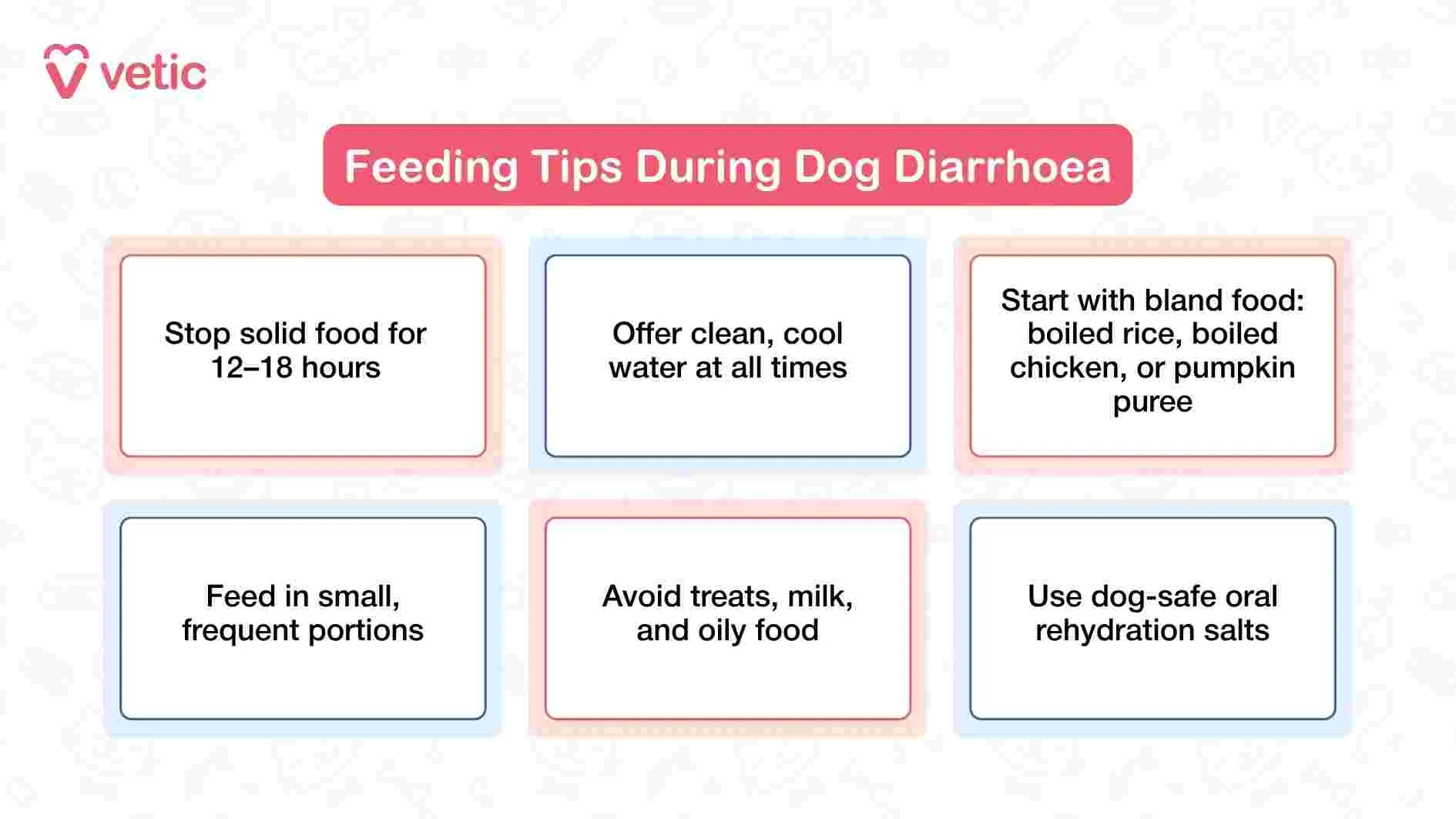 Infographic providing six practical feeding tips for dogs with diarrhea, such as withholding food, offering bland meals, and ensuring hydration.
Infographic providing six practical feeding tips for dogs with diarrhea, such as withholding food, offering bland meals, and ensuring hydration.
It is important to avoid treats, milk, and any oily or fatty foods during this time, as these can exacerbate symptoms. If your dog vomits after eating, continues to have watery stool, or shows any signs of discomfort, stop feeding and consult your veterinarian immediately. Gradual reintroduction of their regular diet should happen over several days once their stools have returned to normal.
When to Contact Your Veterinarian for Dog Diarrhea
While many cases of loose motions in dogs are mild and resolve on their own, it’s always best to err on the side of caution and contact your veterinarian, especially if you have a puppy, an elderly dog, or a dog with pre-existing health conditions. What might appear as mild symptoms can rapidly escalate, leading to severe dehydration and other complications.
You should contact your vet immediately if your dog displays any of the following symptoms alongside loose motions:
- Continuous Vomiting or Refusal to Eat: If your dog cannot keep food or water down, or completely loses their appetite, it’s a red flag.
- Lethargy, Weakness, or Collapse: A significant drop in energy levels, profound weakness, or outright collapse indicates a serious problem requiring urgent attention.
- Blood or Black Streaks in Stool: Fresh red blood (hematochezia) or black, tarry stools (melena) are signs of gastrointestinal bleeding and constitute a medical emergency.
- High Fever or Abdominal Pain: Fever, indicated by a temperature above 102.5°F (39.2°C), coupled with signs of abdominal discomfort like a hunched posture or sensitivity to touch, warrants immediate veterinary assessment.
- Dehydration: Signs of dehydration include sunken eyes, sticky or dry gums, a dry nose, and reduced skin elasticity (skin tenting). This can quickly become life-threatening.
- Weight Loss or Bloating: Unexplained weight loss or a noticeably distended abdomen, especially when combined with diarrhea, could indicate a serious underlying condition.
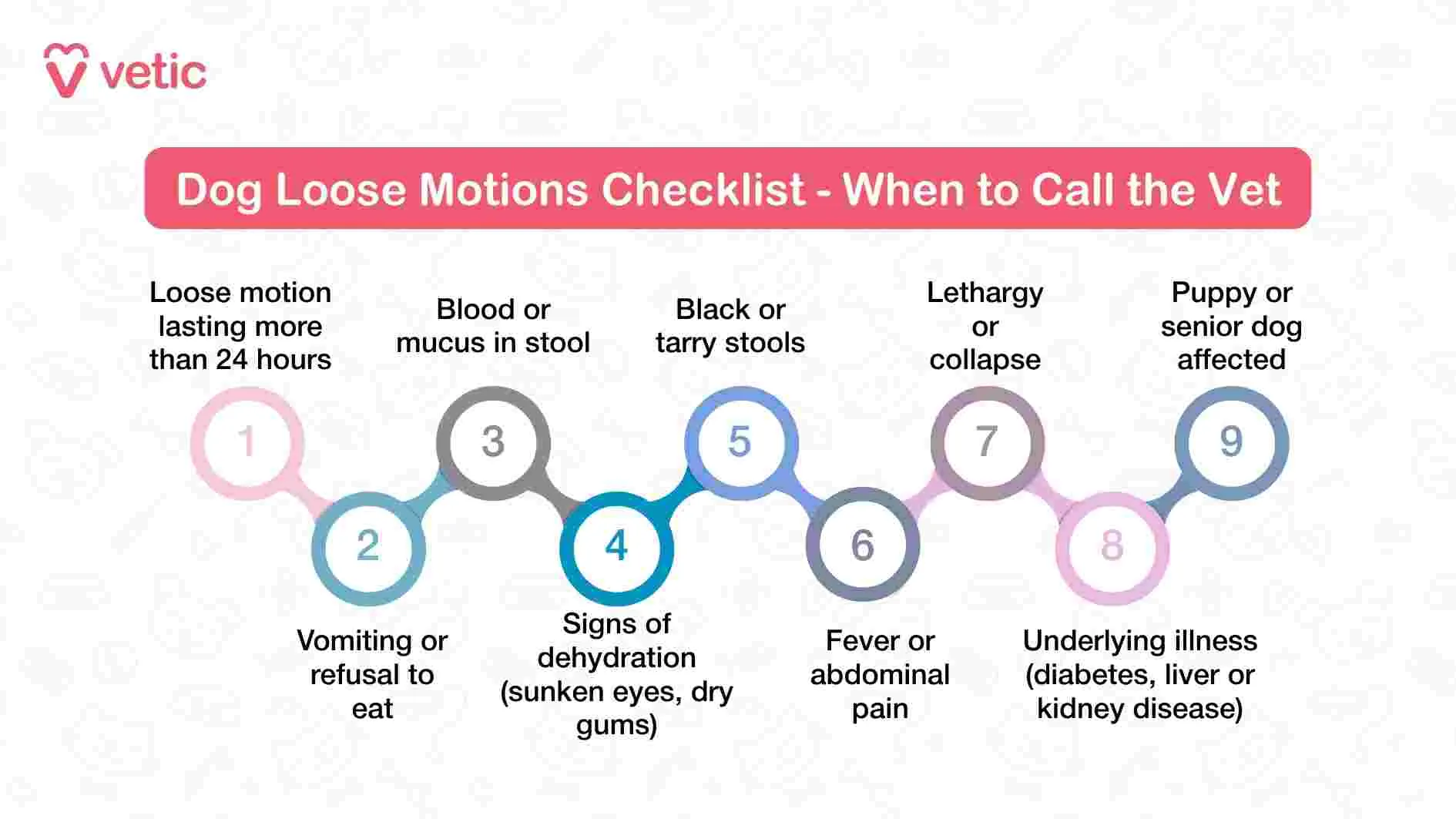 Checklist of critical dog diarrhea symptoms indicating when to contact a veterinarian immediately for urgent care.
Checklist of critical dog diarrhea symptoms indicating when to contact a veterinarian immediately for urgent care.
If diarrhea lasts more than 24 hours, if your dog has underlying diseases such as diabetes, kidney disease, or liver issues, or if your pet is very young or very old, seeking professional advice without delay is crucial. Delaying treatment for severe diarrhea can lead to critical dehydration and electrolyte imbalances, often requiring intensive care like intravenous fluids and hospitalization. Timely veterinary care is essential to ensure a swift and safe recovery for your beloved companion, and can prevent minor issues from becoming major emergencies.
Decoding Your Dog’s Poop: What Different Colors Mean
The color and consistency of your dog’s loose motions can provide valuable clues about what might be happening inside their digestive tract. While it might not be the most pleasant task, observing your dog’s stool is an important part of monitoring their health. Here’s what different shades of dog poop could indicate:
- White Spots in the Poop: The presence of small white spots or rice-like segments often indicates the presence of intestinal worms or their eggs in the stool. If you notice this, consult your vet immediately for an appropriate deworming schedule.
- Green Poop in Dogs: Green stool can sometimes mean your dog has eaten a large amount of grass or other plant material. However, if green diarrhea persists, it could also be a sign of rapid passage through the gut, toxin ingestion, or an imbalance in bile production.
- Yellow or Orange Poop in Dogs: Yellow or orange stools may suggest issues with the liver or gallbladder, or potentially a bacterial infection. If the stool is also foul-smelling and slimy, a visit to your vet for further tests is advisable.
- Black and Tarry Dog Poop: This is a serious indicator of bleeding in the upper gastrointestinal (GI) tract. Black, tarry stools result from digested blood. This is a medical emergency that requires immediate veterinary attention.
- Brown Dog Poop with Red Streaks: Red streaks in otherwise brown stool usually signify fresh bleeding from the lower intestines or rectum. This can be caused by inflammation, irritation, or repeated straining during defecation.
- Grey and Greasy Dog Poop: Stools that appear greyish, pale, and greasy often point to pancreatic or biliary disease. In these conditions, the digestion of fats is impaired, leading to malabsorption and characteristic stool changes.
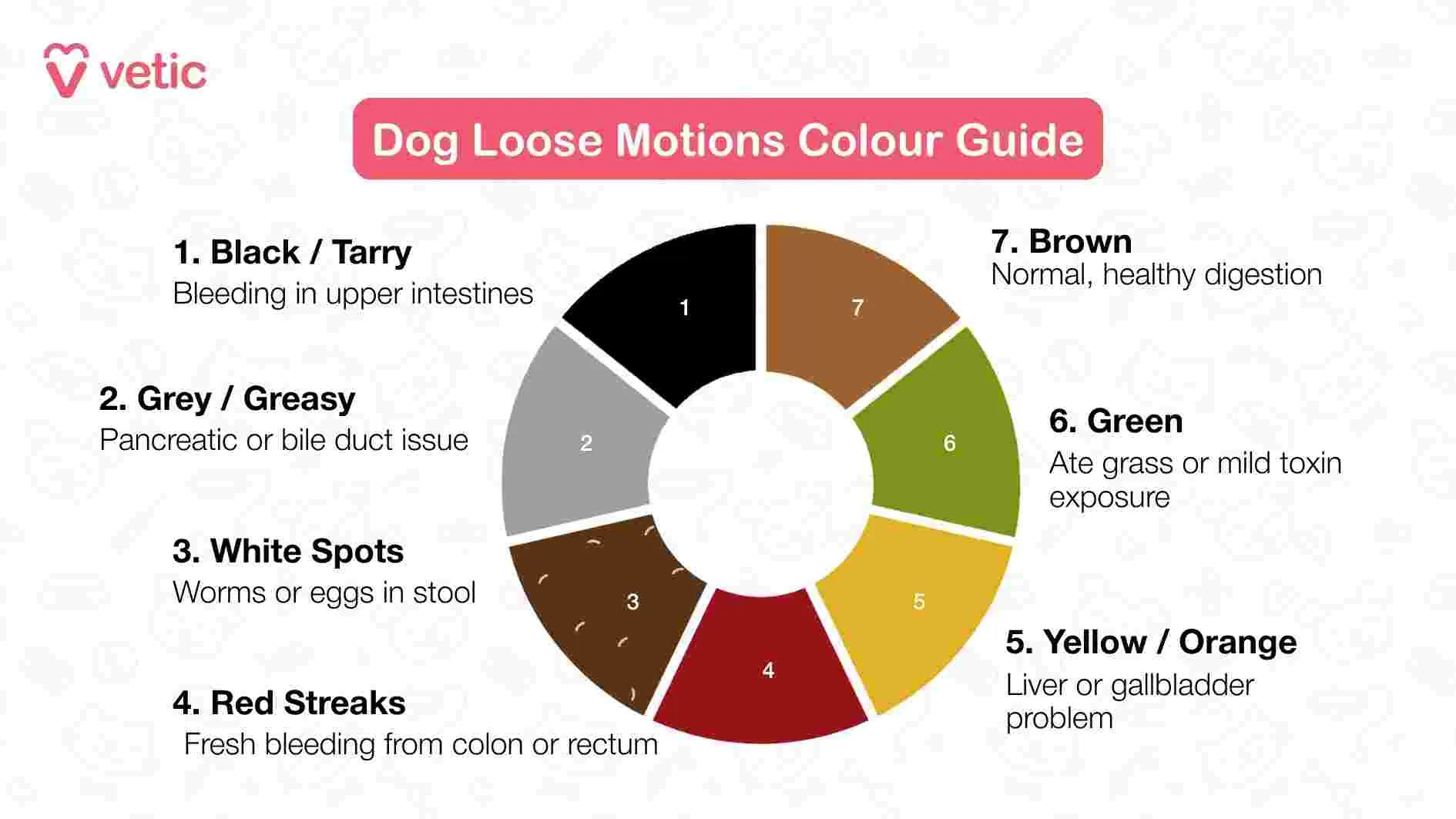 Circular diagnostic color guide explaining what different shades of dog poop mean in terms of a dog's health.
Circular diagnostic color guide explaining what different shades of dog poop mean in terms of a dog's health.
If your dog’s stool color remains abnormal for more than a day, or if you observe any other concerning symptoms, it’s best to collect a fresh stool sample and take it to your veterinarian for analysis. A stool sample can provide vital information to help diagnose the problem and guide treatment.
Preventing Loose Motions in Your Dog
Preventing loose motions in your dog is always better than treating them. By implementing consistent preventive measures, you can significantly reduce the likelihood of your dog suffering from digestive upset. A proactive approach to health and diet is key to maintaining a happy, healthy canine companion.
Here are some essential tips to help prevent future episodes of loose motions in your dog:
- Routine Deworming: Follow your veterinarian’s recommended deworming schedule, especially for puppies, to protect against common intestinal parasites that cause diarrhea.
- Annual Vaccinations: Keep your dog’s vaccinations up to date, particularly for highly contagious viral diseases like Parvovirus and Distemper, which can cause severe diarrhea.
- Maintain Excellent Hygiene: Regularly clean your dog’s food and water bowls. Wash your hands thoroughly after handling pet waste to prevent the spread of bacteria and parasites.
- Post-Walk Cleanups: Always clean up after your dog during walks to prevent them from ingesting contaminated feces from other animals, which can transmit parasites or infections.
- Proper Food Storage: Store your dog’s food in airtight containers to prevent spoilage and contamination. Avoid feeding raw or expired food.
- Keep Harmful Items Out of Reach: Secure trash cans, keep toxic human foods (onions, chocolate, raisins), poisonous plants, and small foreign objects out of your dog’s access.
- Introduce New Diets Gradually: When changing your dog’s food, do so slowly over 7-10 days by mixing increasing amounts of the new food with decreasing amounts of the old. This allows their digestive system to adjust.
- Manage Stress: Identify and minimize sources of stress for your dog, such as loud noises or prolonged solitude, to prevent stress-induced colitis.
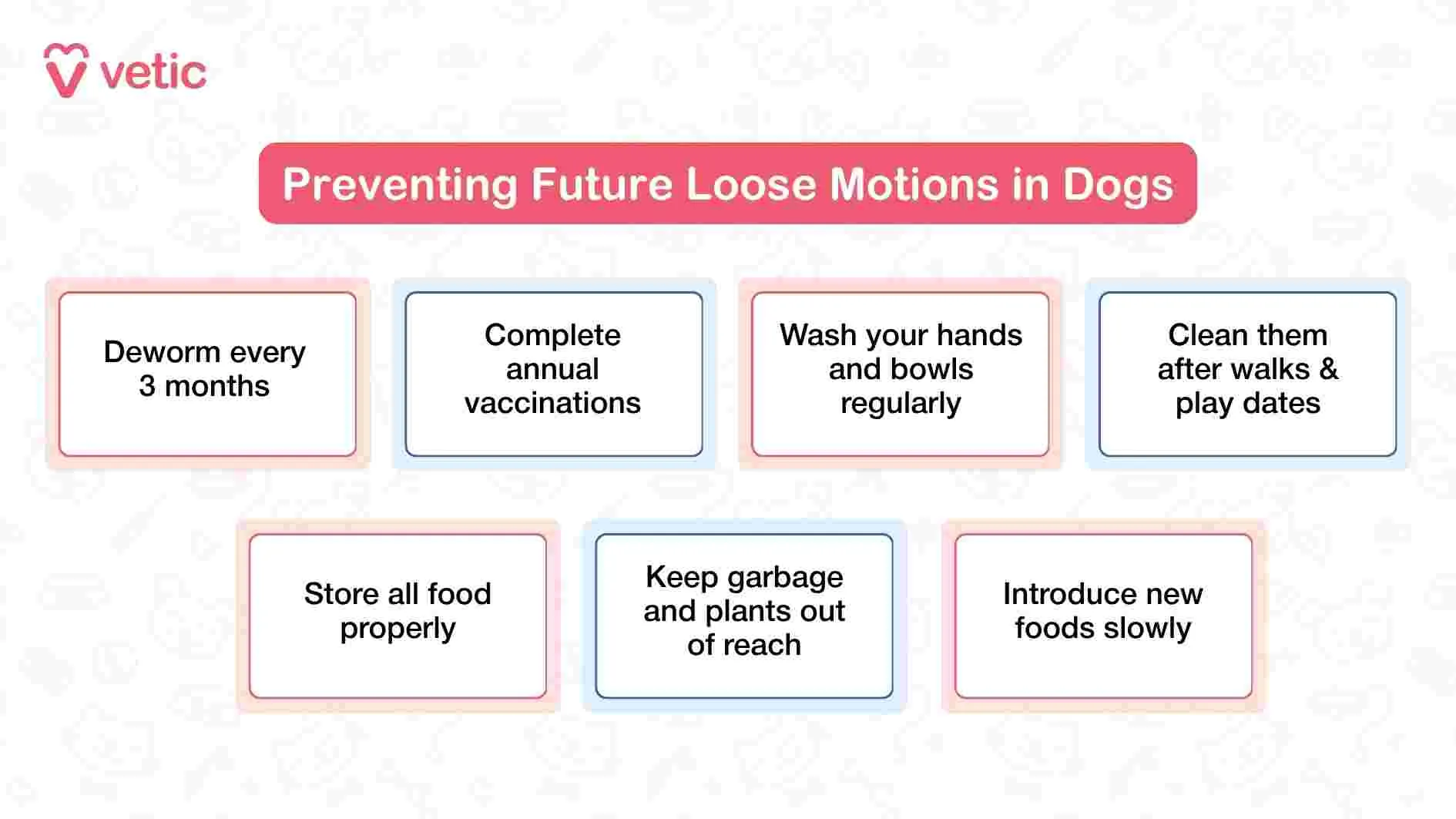 Visual guide displaying seven prevention tips for avoiding future episodes of loose motions in dogs, focusing on routine care and proper feeding.
Visual guide displaying seven prevention tips for avoiding future episodes of loose motions in dogs, focusing on routine care and proper feeding.
By adhering to these preventive measures, you can create an environment that supports optimal digestive health for your dog. While no method can guarantee 100% prevention, these steps significantly reduce the risks associated with loose motions, keeping your dog comfortable and healthy. Implementing a comprehensive strategy that includes regular vet check-ups will go a long way in ensuring your pet’s well-being. Although home remedy for mange is a different topic, the principle of proper care and prevention applies across various canine health issues.
Frequently Asked Questions About Dog Loose Motion
What can cause loose motions in dogs suddenly?
Sudden loose motions are often due to dietary indiscretions, such as eating spoiled food, trash, or table scraps. A rapid change in diet, exposure to toxins, or an acute infection from parasites or bacteria can also be sudden triggers.
How long does dog diarrhea last?
Mild diarrhea typically resolves within 24 to 48 hours with proper rest and a bland diet. However, persistent, severe, or bloody stools warrant immediate veterinary attention.
Can I give human medicine for treating my dog’s loose motion?
No, human medicines are generally unsafe for dogs and can worsen their condition, cause severe side effects, or even be toxic. Always use only vet-prescribed loose motion medicine for dogs.
What home remedies help with loose motions in dogs?
Bland foods like plain boiled chicken, white rice, pumpkin puree, and plain unsweetened yogurt can help soothe the gut. However, always consult your vet before relying solely on home remedies, especially if symptoms are persistent or severe.
Can stress cause loose motion in dogs?
Yes, stress can cause diarrhea in dogs, often leading to a condition known as stress-induced colitis. This can occur during travel, fireworks, or significant environmental changes.
When should I worry about dog diarrhea?
You should worry and contact your vet if diarrhea is accompanied by continuous vomiting, blood in the stool, lethargy, dehydration, severe abdominal pain, or if it lasts for more than 24 hours. Puppies and senior dogs are particularly vulnerable.
How do I prevent loose motion in my dog?
Preventative measures include keeping vaccinations and deworming up to date, avoiding raw or spoiled food and table scraps, introducing new diets gradually, and keeping toxic items out of their reach.
What is the best dog loose motion medicine?
The best medicine depends entirely on the underlying cause. It can range from a combination of probiotics and anti-diarrheals for mild cases, to anti-parasitics, antibiotics, or even fluid therapy for more severe infections or dehydration. Always let your vet diagnose the problem and prescribe the appropriate loose motion medicine for dogs.
In conclusion, loose motions in dogs can range from a minor stomach upset to a symptom of a serious underlying disease. Diligent observation of your dog’s stool color, texture, and frequency, coupled with a strict policy of never self-medicating without veterinary advice, are crucial for their health. A prompt response, ensuring plenty of fluids, providing a light, bland diet, and seeking timely medical care can significantly help your furry friend bounce back to health faster. Always prioritize professional veterinary consultation for any persistent or concerning symptoms. For more insights into maintaining your dog’s optimal health and digestive well-being, explore other articles on Dog Care Story.
